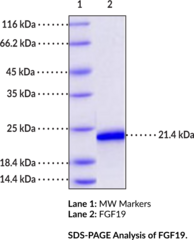Territorial Availability: Available through Bertin Technologies only in France
- Correlated keywords
- FGF 15 19 coreceptor IBD nonalcoholic
- Product Overview:
Fibroblast growth factor 19 (FGF19) is a hepatokine and member of the endocrine subfamily of FGFs with roles in bile acid synthesis, gallbladder filling, glycogen synthesis, and gluconeogenesis.{56100} Mature FGF19 is a secreted 190-amino acid peptide composed of an N-terminal FGFR binding site, a conserved 120-amino acid core, and a C-terminal sequence that facilitates binding to the klotho beta (KLB) co-receptors.{56100,56101} It is derived from a 216-amino acid protein that contains an additional 26-amino acid signaling peptide, which drives constitutive secretion. FGF19 is primarily expressed in the fetal brain and adult gallbladder but is also expressed in various other tissues. Unlike other FGFs, FGF19 has low affinity for heparin and binds to KLB to induce intracellular signaling through FGFR4.{56101} Knockout of Fgf15, the murine ortholog of FGF19, reduces hepatic glycogen levels and induces glucose intolerance in mice, effects that can be reversed by exogenous administration of FGF19.{56102} Fgf15-/- mice also exhibit dysregulated bile acid metabolism. Intracerebroventricular infusion of FGF19 potentiates peripheral insulin signaling in a mouse model of insulin resistance. Serum levels of FGF19 are increased in patients with extrahepatic cholestasis and are reduced in patients with inflammatory bowel disease, primary bile acid malabsorption, type-2 diabetes, and non-alcoholic fatty liver disease (NAFLD). Upregulated FGF19 expression is associated with tumor progression and poor prognosis in patients with hepatocellular carcinoma. Cayman’s FGF19 (human, recombinant) consists of 191 amino acids and has a calculated molecular weight of 21.4 kDa.
Cayman Chemical’s mission is to help make research possible by supplying scientists worldwide with the basic research tools necessary for advancing human and animal health. Our utmost commitment to healthcare researchers is to offer the highest quality products with an affordable pricing policy.
Our scientists are experts in the synthesis, purification, and characterization of biochemicals ranging from small drug-like heterocycles to complex biolipids, fatty acids, and many others. We are also highly skilled in all aspects of assay and antibody development, protein expression, crystallization, and structure determination.
Over the past thirty years, Cayman developed a deep knowledge base in lipid biochemistry, including research involving the arachidonic acid cascade, inositol phosphates, and cannabinoids. This knowledge enabled the production of reagents of exceptional quality for cancer, oxidative injury, epigenetics, neuroscience, inflammation, metabolism, and many additional lines of research.
Our organic and analytical chemists specialize in the rapid development of manufacturing processes and analytical methods to carry out clinical and commercial GMP-API production. Pre-clinical drug discovery efforts are currently underway in the areas of bone restoration and repair, muscular dystrophy, oncology, and inflammation. A separate group of Ph.D.-level scientists are dedicated to offering Hit-to-Lead Discovery and Profiling Services for epigenetic targets. Our knowledgeable chemists can be contracted to perform complete sample analysis for analytes measured by the majority of our assays. We also offer a wide range of analytical services using LC-MS/MS, HPLC, GC, and many other techniques.
Accreditations
ISO/IEC 17025:2005
ISO Guide 34:2009
Cayman is a leader in the field of emerging drugs of abuse, providing high-purity Schedule I-V Controlled Substances to federally-licensed laboratories and qualified academic research institutions for forensic analyses. We are certified by ACLASS Accreditation Services with dual accreditation to ISO/IEC 17025:2005 and ISO Guide 34:2009.





